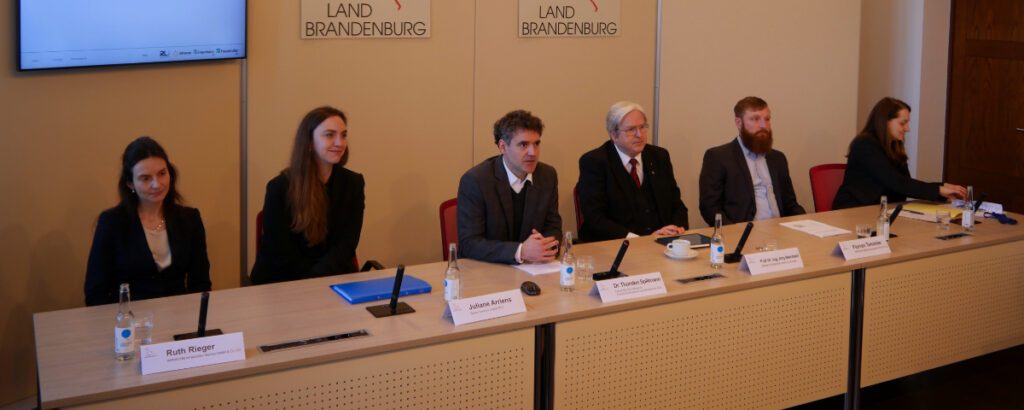Study for a hydrogen transport network in Brandenburg published
February 16, 2023 | Brandenburg’s Minister of Economics Jörg Steinbach presented a feasibility study for the establishment and expansion of an efficient transport network for hydrogen in Brandenburg at a press conference in Potsdam today: It has a total length of about 1,100 kilometers. Of these, around 600 kilometers (54 %) are converted natural gas pipelines and around 500 kilometers (46 %) are new lines. By using existing natural gas infrastructure and bundling routes, about 55 percent of the necessary investment costs can be saved.
RLI prepared the feasibility study as part of the project consortium with the Fraunhofer Institute for Energy Infrastructures and Geothermal Energy (IEG), the Fraunhofer Institute for Systems and Innovation Research (ISI) and INFRACON Infrastruktur Service GmbH & Co. KG elaborated. Juliane Arriens, head of the research area Mobility with Renewable Energies, and representatives of the participating organizations presented the results to the public today.
“An efficient hydrogen transport infrastructure is the backbone of the future hydrogen economy. This is because it is the only way to transport the quantities of hydrogen that our industry needs for this purpose. We now have a concept for a Brandenburg hydrogen start-up network, including concrete routes in the various time periods.” This was stated today by Economics Minister Jörg Steinbach at the presentation of the feasibility study.
As part of the study, which was commissioned by the Brandenburg Ministry of Economic Affairs, Labor and Energy (MWAE) in 2022, a comprehensive analysis was carried out to forecast future hydrogen consumption and production potential up to 2045. Demand-driven, cost-effective routing options were then derived from this analysis. The goal is to develop a superordinate hydrogen network that connects regional hydrogen generators, storage facilities and end users and fits into a Germany-wide hydrogen infrastructure.
The complete press release of the MWAE is available here (in German).
The presentation of the press conference can be found here (in German).
The project page can be found here.
